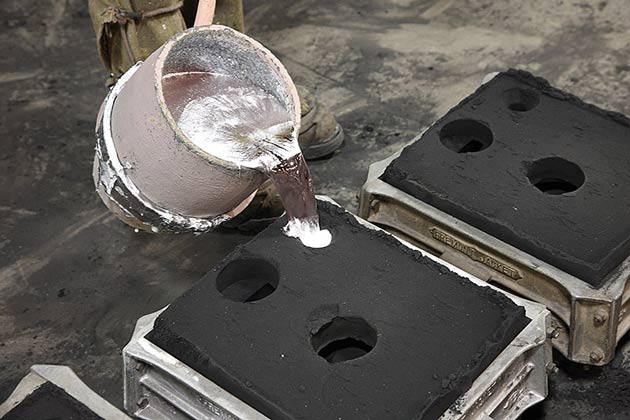The Buzz on Stahl Specialty Company
The Buzz on Stahl Specialty Company
Blog Article
8 Easy Facts About Stahl Specialty Company Shown
Table of ContentsThe Ultimate Guide To Stahl Specialty CompanyThe Ultimate Guide To Stahl Specialty CompanyEverything about Stahl Specialty CompanyRumored Buzz on Stahl Specialty CompanyStahl Specialty Company Can Be Fun For Anyone
The refined difference hinges on the chemical material. Chemical Comparison of Cast Aluminum Alloys Silicon promotes castability by lowering the alloy's melting temperature and enhancing fluidity during spreading. It plays a critical role in enabling complex molds to be filled up accurately. Additionally, silicon adds to the alloy's strength and wear resistance, making it useful in applications where sturdiness is critical, such as auto components and engine parts.It also enhances the machinability of the alloy, making it easier to process right into completed items. This way, iron adds to the overall workability of aluminum alloys. Copper boosts electric conductivity, making it advantageous in electric applications. It also improves corrosion resistance and includes in the alloy's total toughness.
Manganese adds to the toughness of aluminum alloys and enhances workability. It is typically used in functioned aluminum products like sheets, extrusions, and profiles. The presence of manganese aids in the alloy's formability and resistance to fracturing throughout fabrication processes. Magnesium is a lightweight element that supplies strength and effect resistance to aluminum alloys.
Zinc enhances the castability of aluminum alloys and aids manage the solidification process throughout casting. It enhances the alloy's strength and hardness.
How Stahl Specialty Company can Save You Time, Stress, and Money.
Since aluminum-silicon alloys have great casting buildings, high gas residential properties, easy processes, and outstanding rust resistance, aluminum-silicon alloys are most commonly utilized in the die-casting sector at home and abroad. At the very same time, aluminum-silicon alloys are likewise fairly early and extensively identified alloys developed and used in die-casting. After constant study and renovation, many of the current worldwide mainstream aluminum-silicon alloys have been wrapped up and are absolutely nothing greater than A356, A360, A380, ADC12, B390, and A413.
The main thermal conductivity, tensile toughness, return toughness, and prolongation vary. Select suitable basic materials according to the performance of the target product generated. Among the above alloys, A356 has the highest thermal conductivity, and A380 and ADC12 have the least expensive. The tensile limit is the contrary. A360 has the very best return stamina and the highest possible elongation rate.

About Stahl Specialty Company
In accuracy casting, 6063 is well-suited for applications where elaborate geometries and top notch surface finishes are paramount. Examples include telecommunication enclosures, where the alloy's premium formability enables smooth and cosmetically pleasing layouts while keeping structural honesty. In the Illumination Solutions market, precision-cast 6063 elements produce sophisticated and reliable lights fixtures that need intricate forms and good thermal efficiency.
(http://tupalo.com/en/users/7986108)
The A360 shows exceptional elongation, making it excellent for facility and thin-walled components. In precision spreading applications, A360 is well-suited for industries such as Customer Electronics, Telecommunication, and Power Devices.

In accuracy spreading, aluminum 413 beams in the Consumer Electronic Devices and Power Equipment sectors. It's generally made use of to craft detailed elements like mobile phone real estates, electronic camera bodies, and power device housings. Its precision is exceptional, with tight resistances approximately 0.01 mm, making certain remarkable product assembly. This alloy's remarkable deterioration resistance makes it an excellent option for exterior applications, making sure resilient, long lasting items in the pointed out industries.
The Best Guide To Stahl Specialty Company
As soon as you have made a decision that the light weight aluminum pass away casting process appropriates for your job, a crucial following step is selecting one of the most appropriate alloy. The aluminum alloy you choose will significantly influence both the spreading process and the homes of the end product. Due to this, you need to make your choice very carefully and take an enlightened approach.
Determining the most ideal light weight aluminum alloy for your application will imply evaluating a vast variety of qualities. The very first group addresses alloy features that affect the production procedure.
The alloy you pick for die casting straight influences several aspects of the spreading procedure, like just how very easy the alloy is to deal with and if it is you can try this out prone to casting issues. Hot breaking, also referred to as solidification fracturing, is a regular die casting defect for aluminum alloys that can lead to inner or surface-level tears or fractures.
Stahl Specialty Company Things To Know Before You Buy
Specific light weight aluminum alloys are more susceptible to hot splitting than others, and your selection must consider this. An additional typical defect discovered in the die casting of aluminum is die soldering, which is when the actors stays with the die walls and makes ejection tough. It can damage both the actors and the die, so you should seek alloys with high anti-soldering residential or commercial properties.
Deterioration resistance, which is already a notable feature of aluminum, can differ substantially from alloy to alloy and is a crucial characteristic to think about depending on the ecological conditions your product will be exposed to. Put on resistance is an additional residential property frequently looked for in aluminum items and can distinguish some alloys.
Report this page